Can Donald Trump really change his image?
- Published
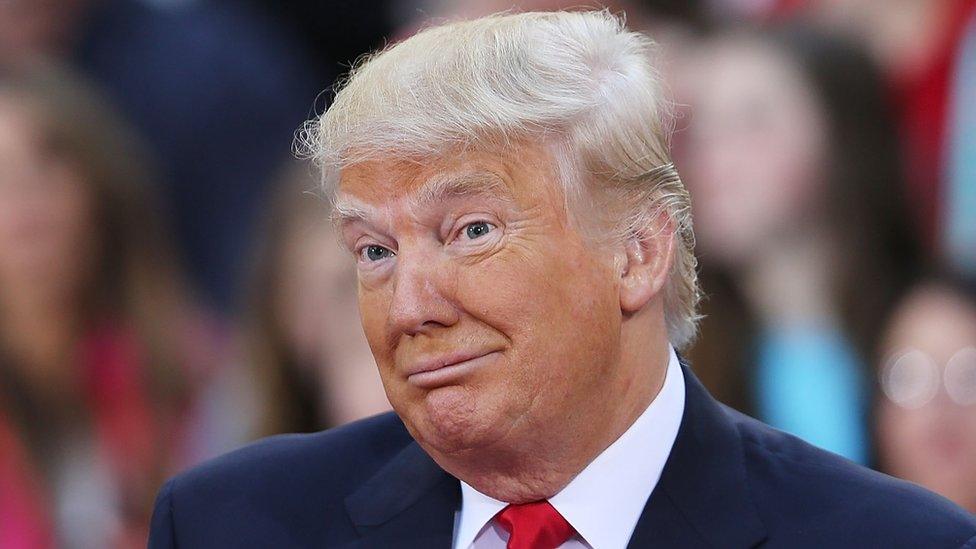
On Thursday the Great Trump Pivot went from pundit speculation and political tea-leaf reading to official campaign strategy.
A leaked recording of top Trump adviser Paul Manafort's presentation to Republican Party insiders in Florida reveals that the kinder, gentler Donald Trump on display following his dominating New York primary win is a deliberate strategy.
"The part he's been playing is evolving," Manafort said.
Gone were the petty insults. Missing was the relentless immigrant bashing. In its place was a focus on his economic message, boasts about the breadth of his support and a more humble call to arms.
"Tomorrow, we go back to work," Mr Trump concluded.
Of course, old habits die hard, and the following day at rallies in Indiana and Maryland Mr Trump sounded a bit more like his old self. Ted Cruz was "Lyin' Ted" once more, and he revelled in the crowd's chants to "build the wall" along the US-Mexico border.
During a television interview, however, Mr Trump shed some additional light on his changing demeanour. During the rough-and-tumble, crowded primary process, he said, he had to mix it up with his fellow candidates.
"If I didn't, if I acted very presidential, I wouldn't be sitting up here today, somebody else might be," he said, external. "It wouldn't be me."
He said, however, that a change is coming "very soon".
"At the right time, I will be so presidential, you will be so bored," he said. "You will say, 'Can he have a little bit more energy?' But I know when to be presidential."
(Somewhere out there, Jeb "low energy" Bush must be laughing through his tears.)
For the remaining three months before the Republican National Convention in Cleveland - and beyond - Mr Trump will have to walk a fine line. Authentic but controlled. A rebel who knows how to play nice.
Can he pivot without losing his balance? It depends how three groups respond to Mr Trump's efforts, which will include detailed policy speeches over the coming weeks and fewer late-night Twitter dust-ups and talk-show taunting.
Trump Nation
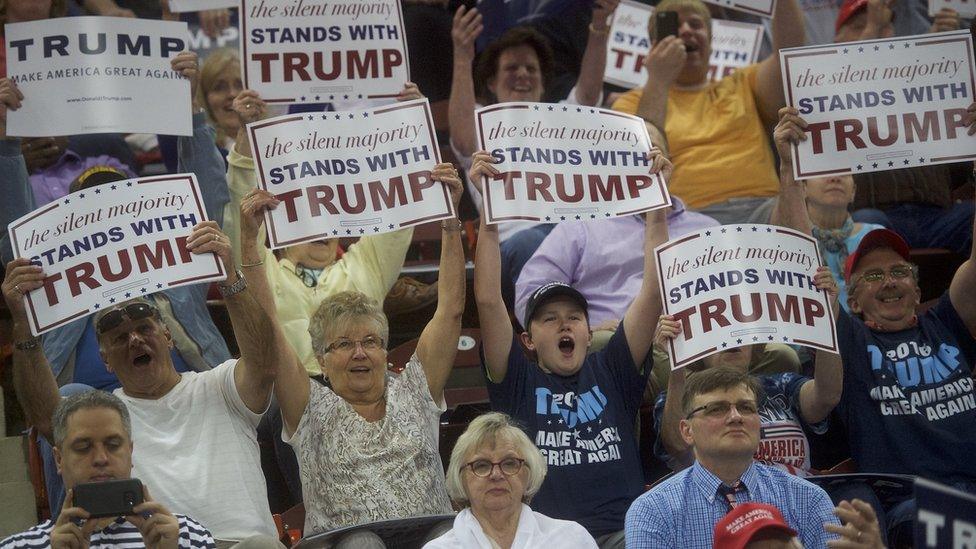
Donald Trump's supporters don't know how to quit him
Mr Trump's legions have seen their candidate relentlessly savaged by his competitors, media commentators and independent attack advertisements.
They've watched as Mr Trump has occasionally tied himself in knots over issues like abortion, appeared hopelessly out-of-his-depth during detailed foreign policy questioning, and expressed views on the Iraq War and Planned Parenthood that usually constitute conservative heresy.
And yet his base level of support has remained remarkably stable.
"I have the most loyal people," Mr Trump said, external in January. "I could stand in the middle of Fifth Avenue and shoot somebody, and I wouldn't lose any voters."
For his dedicated followers, Mr Trump is unassailable. They have an extreme distrust of the Republican Party establishment and the media (which they regularly heckle during Trump campaign rallies). So a few articles in the Washington Post and the New York Times revealing that the bellicose, unfiltered Donald Trump of the primary season is nothing more than a "persona" will likely be met with a shrug.
Mr Trump's pivot could have problems, but his supporters aren't among them.
The Republican establishment
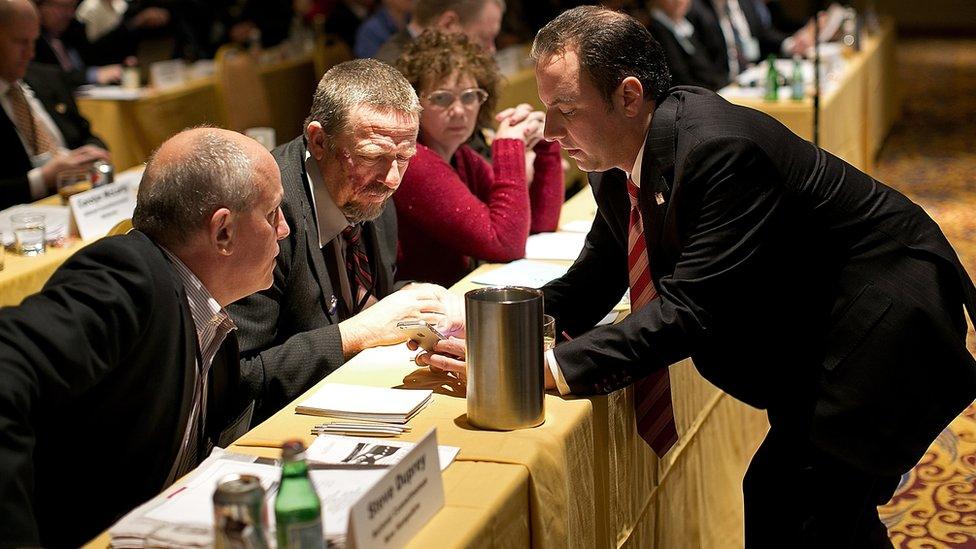
Can Republican Party chairman Reince Priebus (right) and fellow Republican insiders make peace with a Trump candidacy?
There was a point during the Republican primary campaign, shortly after Mr Trump's dominating wins in the 1 March Super Tuesday states and two weeks later in Florida, where the Republican Party seemed to be making peace with the prospect of a Donald Trump nomination.
Then a combination of candidate excesses and campaign rally violence caused the party powers to have second (third and fourth) thoughts.
Mr Trump's new campaign team, with Manafort in charge, is trying to undo that damage.
The reality is that the Republican establishment - including both the committed and uncommitted delegates who will be in the hall at the Republican National Convention in Cleveland - don't have to love Donald Trump, but they have to at least be able to live with him.
If Mr Trump spends the next two months as he has the last six, barrelling through the news cycles with one outlandish controversy after another, they may find justification to deny him the nomination even though he will likely end the primary season with hundreds more delegates and millions more votes than second-place Cruz.
Poll numbers showing him being destroyed by Democrat Hillary Clinton and scuttling the hopes of his down-ballot Republicans will just add fuel to the fire.
"The negatives are going to come down, the image is going to change," Manafort assured the Republicans gathered in Florida.
Mr Trump has to finish strong and win as many delegates as he can in the remaining primary contests, but if he falls short of 1,237 pledged delegates, as he is likely to do, this perception campaign could be decisive.
The American public
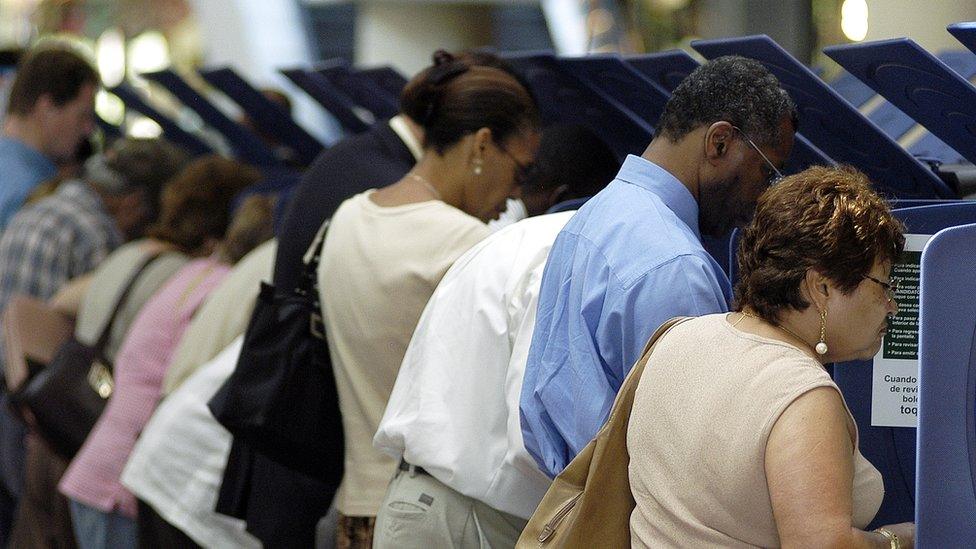
American voters in November may render the final verdict on Mr Trump's rebranding efforts
Mr Trump has his die-hard supporters. He also has an insurmountable lead in the Republican delegate count and popular vote that will make it difficult, and extremely messy, to deny him the party's nomination.
But what about the American people? Mr Trump's rebranding attempts will be for naught if he can't convince a wide swath of the public that views him with scepticism bordering on disdain to give him another chance.
The current outlook is gloomy. In the latest NBC News poll, external, 65% of respondents had a negative view of the Republican front-runner versus only 24% who saw him positively. Hillary Clinton, by contrast, had a 56-32 negative-to-positive split.
Manafort, however, explained that the Democrat's negatives were more durable than those of his candidate.
"Fixing personality negatives is a lot easier than fixing character negatives," he said. "You can't change somebody's character. But you can change the way somebody presents themselves."
It's a tall mountain to climb, but one the Mr Trump has surmounted once already. When he first announced his candidacy, the New Yorker's prospects were roundly dismissed, external because of high negatives within his own party. In past presidential contests, no candidate - particularly one as well-known as Mr Trump - had been able turn around such ratings and find electoral success.
History, it turned out, was a lousy guide. In a few months Mr Trump was finding support across a wide swath of the Republican Party - moderates and ultra-conservatives, evangelicals and Tea Party seculars.
It was an unprecedented transformation.
Now Mr Trump and his team are seeking another transformation. It seems far-fetched, but campaigns aren't conducted in a vacuum. He doesn't have to be great. He doesn't have to be adored. He just has to get more votes than his Democratic opponent.
And Donald Trump is now taking steps to tone down the rhetoric and put himself in a position to make that happen.
- Published22 April 2016
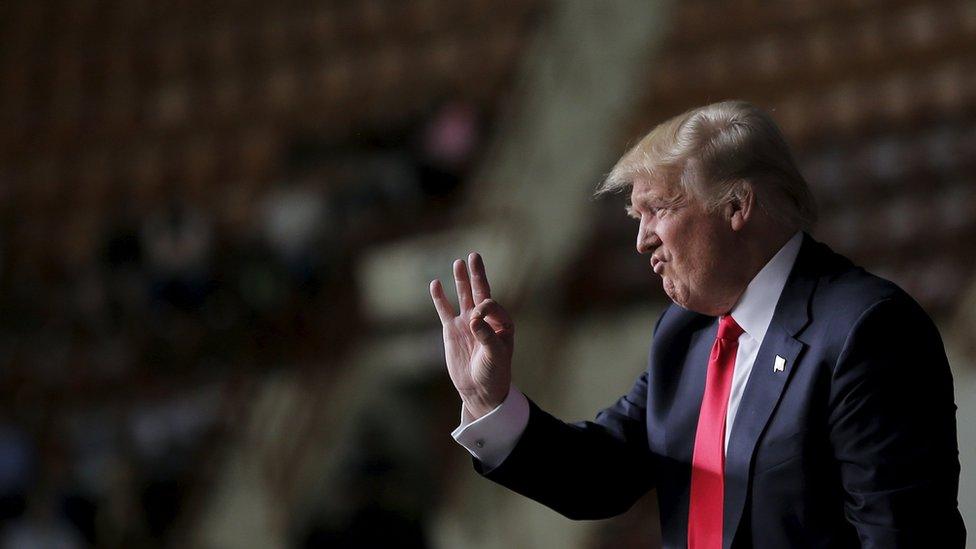
- Published20 April 2016
- Published15 April 2016